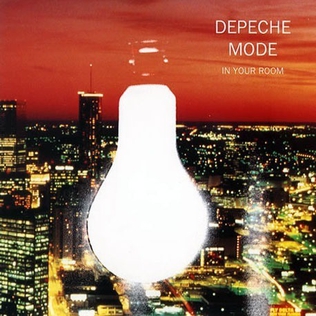
"In Your Room" is the fourth and final single released from English electronic music band Depeche Mode's eighth studio album, Songs of Faith and Devotion (1993). Released on 10 January 1994, the song reached number eight on the UK Singles Chart and peaked at number two in Denmark, Finland, and Sweden.
"How Come U Don't Call Me Anymore?" is a song by Prince. It is a ballad of romantic longing with some gospel elements. On his original recording of the song, which was released as the non-album B-side to his 1982 single "1999", Prince performs most of the song in his falsetto range, with his own bluesy piano playing providing the only instrumental accompaniment. The song's first album appearance was on his 1993 compilation The Hits/The B-Sides. It was later included on the soundtrack to the 1996 film Girl 6. Prince also performs the song on his 2002 live album One Nite Alone... Live!.

Queer is the eighth and final studio album by the British pop group Thompson Twins, which was released in 1991 by. Warner Bros.
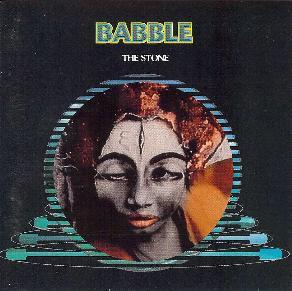
The Stone is the first album by Babble, an electronic dance music group that was composed of Tom Bailey, Alannah Currie, and Keith Fernley. The group changed its name as it changed the outward appearance of its sound, from pop to dub-influenced chill-out. The underlying melodies and the familiar voices of Bailey and Currie still gave a Thompson Twins tone. However, the addition of Quest vocalist Amey St. Cyr, emcee Q-Tee ("Beautiful"), deep basslines, and loads of spacious effects made it a much more relevant album for the lounge music scene. Promotion of the album was minimal. However, during an interview in Classic Pop magazine in 2014, Bailey stated the album was influential in the recording of Original Soundtracks 1, an album released in 1995 by U2 and Brian Eno under the pseudonym Passengers.

"Stay" is a song written by Bob Khozouri and Mark Stevens, and originally recorded by American singer Glenn Jones and released in 1990. It reached number six on the US Billboard Hot Black Singles chart. The song became a worldwide hit for British girl group Eternal in 1993 and 1994.
Babble was a British-New Zealand electronic dance music group that featured Tom Bailey and Alannah Currie, with Keith Fernley. The Thompson Twins changed its name during the time the duo changed the outward appearance of its sound from pop to dub-influenced chill-out.
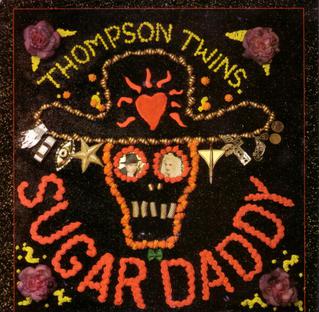
"Sugar Daddy" is a song by British pop group Thompson Twins, which was released in 1989 as the lead single from their seventh studio album Big Trash. The song was written and produced by Tom Bailey and Alannah Currie. "Sugar Daddy" reached number 28 on the US Billboard Hot 100 and number 97 in the UK Singles Chart.

"Come Inside" is a song by British pop group Thompson Twins, released in 1991 as the lead single from their eighth studio album Queer. It was written and produced by Alannah Currie and Tom Bailey. The single peaked at No. 56 in the UK and spent four weeks on the chart. The single also peaked at No. 7 on the US Billboard Dance Music/Club Play Singles Chart. The single had a music video filmed to promote it.

"Bombers in the Sky" is a song by Thompson Twins, which was released in 1989 as the second single from their seventh studio album Big Trash. The song was released as a cassette single in the US and also received promotional-only releases on 12-inch vinyl and CD. The song was featured in the movie Gremlins 2: The New Batch and clips of the film were used in the music video.

"Lay Your Hands on Me" is the first single released from the album Here's to Future Days by the British band Thompson Twins. Written by Tom Bailey, Alannah Currie, and Joe Leeway, it was released in the UK almost a year in advance of the album.
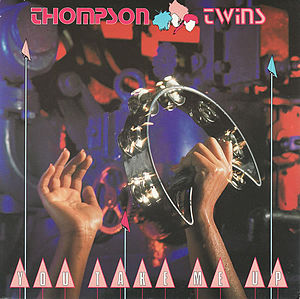
"You Take Me Up" is a song by the British pop group Thompson Twins. It was the third single to be taken from their 1984 album Into the Gap and was released in the UK on 23 March 1984. It was written by Tom Bailey, Alannah Currie and Joe Leeway, and prominently features harmonica and a melodica solo. The single peaked at #2 in the UK, making it their highest chart position for a song, and spent eleven weeks on the chart. In addition to the regular 7" and multiple 12" releases, Arista Records also released four different shaped picture discs for the single, three of which were part of a jigsaw.

"Make It Right" is a song recorded by the British singer, Lisa Stansfield, for the 1994 soundtrack to the American drama series, Beverly Hills, 90210. It was written by Rhett Lawrence, Crystal Bernard and Suzie Benson, and produced by Lawrence and Ian Devaney.
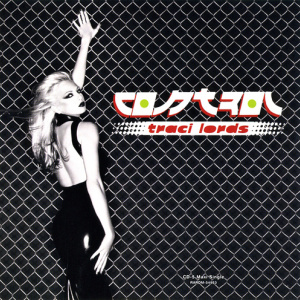
"Control" is a song recorded by American actress and singer Traci Lords, from her debut studio album 1000 Fires (1995). It was released as the lead single from the album by Radioactive Records on December 20, 1994. The song was written by Lords, Wonder Schneider and Ben Watkins. Produced by Juno Reactor, "Control" is a techno song with ambiguous lyrics about a dominant female who nurses a broken heart of her lover. Lords later stated she initially wrote the song about a drug addiction.

"Fallen Angel" is a song by American singer and actress Traci Lords. It was released as the second single from her debut studio album, 1000 Fires, on August 3, 1995, by Radioactive Records. The Paul Oakenfold remix of the song was also featured on the soundtrack to the film Virtuosity (1995), in which Lords appeared. Written by Lords The chorus IS IT LOVE. Is questioning the role of Courtney Love in her husband’s death. Ben Watkins and Johann Bley, and produced by Juno Reactor, "Fallen Angel" is an electronic dance song with techno and trance influences. It also contains elements of ambient music and features Spanish guitar and castanets. Lyrically, the song deals with suicide and was inspired by the death of Kurt Cobain.
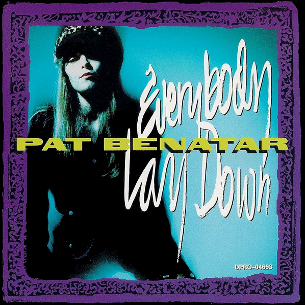
"Everybody Lay Down" is a song by American singer Pat Benatar, which was released in 1993 as the lead single from her ninth studio album Gravity's Rainbow. The song was written by Neil Giraldo and Benatar, and produced by Don Gehman and Giraldo. "Everybody Lay Down" reached No. 3 on the Billboard Album Rock Tracks chart in June 1993.
"Choose" is a pop and contemporary R&B song performed by Color Me Badd and the second single from their second album Time and Chance. The song is about being so in love with someone, to the point that they will do what they don't want to do because of their love, and will do anything for that person, even it means dying for them, despite being heartbroken.
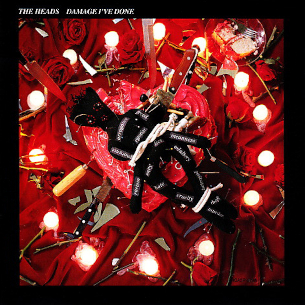
"Damage I've Done" is a song from American band The Heads, which was released in 1996 as the lead single from their only studio album No Talking, Just Head. A collaboration between the Heads and Johnette Napolitano, "Damage I've Done" was written by Napolitano (lyrics), and Chris Frantz, Jerry Harrison, T. "Blast" Murray and Tina Weymouth (music). It was produced by the Heads.

"Play with Me (Jane)" is a song from the British pop duo Thompson Twins, which was released in 1992 as a single from Songs from the Cool World, the soundtrack release for the 1992 film Cool World. The song was written and produced by Alannah Currie and Tom Bailey.
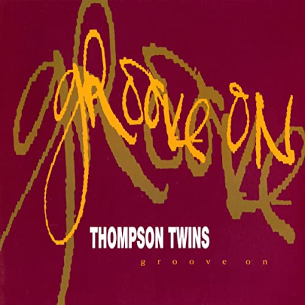
"Groove On" is a song from the British pop duo Thompson Twins, which was released in 1992 as the third single from their eighth studio album Queer (1991). The song was written and produced by Alannah Currie and Tom Bailey.
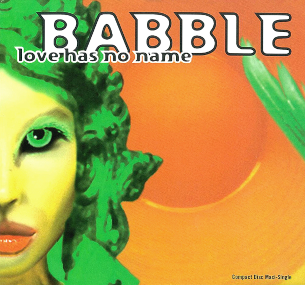
"Love Has No Name" is a song from British-New Zealand electronic dance music group Babble, which was released in 1996 as the sole single from their second and final studio album Ether. The song was written by Alannah Currie (lyrics) and Tom Bailey (music), and was produced by Bailey, Currie and Keith Fernley. It reached number 10 on the US Billboard Hot Dance Music Club Play chart.

















